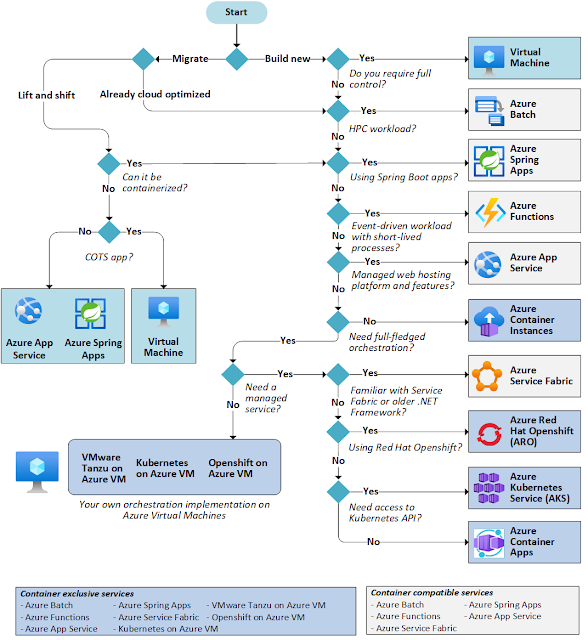This Week I Learned - Week #36 2024
This Week I Learned -
* Decision tree for Azure Compute Selection in 2018 & 2024 [Image Credit: Microsoft]
* I think EA (and in fact all computing since the very beginning of computing) has always been about “Digital Transformation”. - Gideon Slifkin
* How many EAs does it take to change a light bulb?
None, that's implementation.
"EA: We herd the cats to develop the plans."
* AI is the coming together of two forces that have become more powerful over the last few decades. The first is increasing (and cheaper) computing power, often coming into smaller and smaller packages; our phones are now computationally more powerful than the very first personal computers. The second is the cumulation of data, both quantitative and qualitative, especially with social media accelerating personal data sharing.
* The threat to your job or profession, from AI, will be greater if your job is mostly mechanical, rule-based and objective, and less if it is intuitive, principle-based and open to biases. The key to thriving in an AI-driven world lies in embracing versatility, nurturing uniquely human skills, and continuously adapting to the changing technological landscape.
* Rattibha collects and curates the best threads from 𝕏 (formerly Twitter) based on community recommendations, presenting them in an easy-to-read format with options to print, share, save, and convert to PDF, all for free. To use the bot, follow @rattibha on 𝕏 and simply reply or retweet with their username to receive a thread link.
* "I see a world increasingly divided between number crunchers, who have abandoned common sense and intuition in pursuit of data analytics and complex models and story tellers, whose soaring narratives are unbounded by reality. Each side is suspicious of the other, the story tellers convinced that numbers are being used to intimidate them and the number crunchers secure in their belief that they are being told fairy tales." - Aswath Damodaran
* Narrative and Numbers: The Value of Stories in Business by Aswath Damodaran connects stories to numbers in investing and valuation. It is the tenth book that he has authored.
* Byju’s exemplifies both sides of the Halo Effect. Once celebrated as India's largest EdTech success, it has now become one of the country’s biggest startup failures. Even legendary internet business analyst Mary Meeker, known for her early investments in Facebook, Uber, and Airbnb, was impressed by Byju's potential, making it her first investment in India in 2020. In December 2021, Churchill Capital even offered $4 billion to take Byju’s public in the US via a SPAC deal, valuing the company at $48 billion. However, just 28 months later, that lofty valuation seems a distant memory—a reminder that the Halo Effect can shift dramatically, from admiration to skepticism. Recognizing this phenomenon during both good and bad times can help us make more balanced investment decisions.
* We have gone on in the pursuit of leisure and luxury until the whole tendency of this day is to strive to continue giving less of our time to producing the necessities of life and more of it to an eager quest of ease, finery, pleasure and "sports." - by Thomas Dyson (1851-1915) in The Efficient Man
 |
| An illustration in "The Efficient Man" |
* "A literary genius, it is said, resembles all, though no one resembles him." - Dr S. Radhakrishnan
* "Good people do not need laws to tell them to act responsibly. Bad people will find a way around the laws" - Plato





Comments
Post a Comment